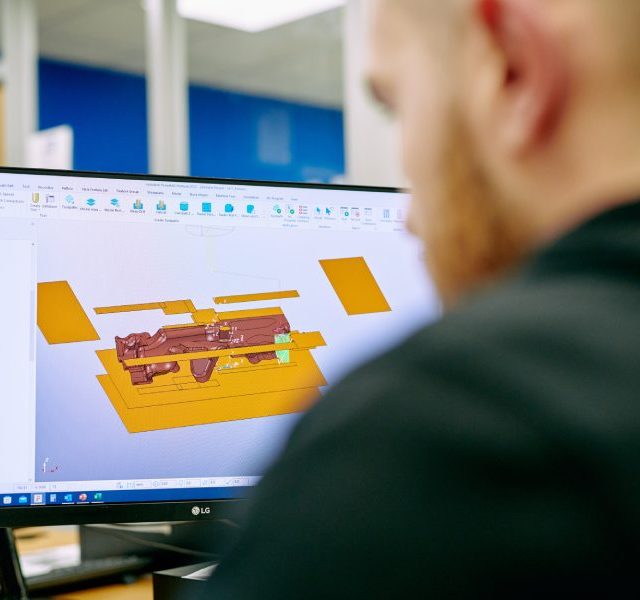Quantum Innovation

The new dawn of quantum technology can solve complex problems for real-world applications, revolutionising how we see the human body and the world.
In collaboration with the region’s world-class universities, laboratories and industry partners, businesses in the West Midlands are developing quantum-enabled products and services to help solve critical global challenges.
R&D in quantum technologies will play a crucial role in science and technology
In 2014, the UK National Quantum Technologies Programme (NQTP) – the first of its kind in the world – established the UK Quantum Technology Sensors and Timing hub at the University of Birmingham. Recognised as only one of four leading national quantum centres, it provides a crucial landing hub for spinout companies emerging from academia in the West Midlands.
Working with over 70 industry partners, including RSK, Teledyne e2v, BP, BAE Systems and Network Rail, the hub has extensive experience participating in around 25 Innovate UK Quantum projects. This includes exploring sensor technologies for brain imaging to understand health conditions, measuring the current flow inside electric vehicle batteries to detect faults, evaluate their health and estimate their charge, as well as identifying unknown underground conditions which present risk in infrastructure projects, significantly reducing delays and cost overruns.
In the West Midlands, businesses are scaling the power of quantum to impact the world we live in, commercialising ground-breaking innovations and creating a wave of exciting opportunities across our region’s sectors including transport, healthcare, telecommunications and cybersecurity.
Why is quantum innovation important?
With an emphasis placed on MedTech, CleanTech and AdvancedTech, the West Midlands is leading the global mission to develop the products and services needed to meet tomorrow’s challenges. Quantum technologies provide critical answers to questions in drugs and materials development, climate change, cyber security and financial services.
As the West Midlands continues to grow its academic strengths in quantum, companies in the region also have access to the Aston Institute of Photonic Technologies (AiPT), one of the world’s leading photonics research centres. This is providing significant skills and infrastructure to propel the growth of the quantum sector amongst manufacturing supply chains in electronics and photonics.
Science and tech superpower 2030 in quantum
Boosted by £2.5bn UK government investment over the next ten years, the National Quantum Strategy will fund new frontiers of quantum research, training and education along with business and infrastructure support. This will make the UK a highly attractive destination to start and grow quantum businesses whilst creating high-quality jobs. A recent £45m investment was announced to drive breakthroughs in healthcare, energy and transport industries, further stimulating the growth of the quantum sector.
With the West Midlands at the forefront of the UK Government’s mission to become a Science and Technology Superpower by 2030 – and quantum being one of five high-priority technologies identified – the region’s expertise in this technology can act as a catalyst to unlock further potential in the other critical areas which include artificial intelligence, engineering biology, semiconductors and future telecoms.

The UK is already one global leader in quantum and to maintain that position this government will continue to invest in this transformational technology propelling the UK into a new era of technological prowess and economic growth.
How West Midlands companies are utilising Quantum to innovate
West Midlands companies are collaborating with the region’s world-class R&D ecosystem to pioneer exciting new developments in the field of quantum. This is leading to a wealth of exciting new opportunities that could provide transformative for a diverse range of industries.
Quantum computing companies from the West Midlands were among the winners in a £15 million government competition.
Exploring the benefits of using quantum technologies in various areas, including health, transport and net zero, funds for the winners were drawn from the Quantum Catalyst Fund; an initiative aiming to accelerate the adoption of quantum solutions by the public sector and deliver benefits for citizens in public services.
DELTA g Limited
Delta G Limited are developing the Gravity Cartography Catalyst (GCC) project, which will deliver the world’s first commercial single-button gravity gradiometer into the hands of end users. This will successfully enable the detection of buried features from their gravity profile alone. The University of Birmingham and its UK Quantum Technology Sensors and Timing Hub have worked in close collaboration with the business to provide scientific support.

ColdQuanta UK Limited
ColdQuanta UK Limited are at the forefront of a number of exciting developments that could provide game-changing transformation in the world of navigation and defence.
Their Quantum Contextual Artificial Intelligence for Long-range Correlations (Q-CALC) project will revolutionise data analysis within the defence industry to improve prediction and decision-making for defence applications.
Alternatively, the Continuous Quantum Inertial Navigation Systems (CQINS) project will pave the way toward deployable quantum-enhanced inertial navigation systems, which can be used to provide secure positioning and navigation capability for the UK. This is opposed to the current overreliance on Global Navigation Satellite Systems (GNSS) which present a single point of failure.
MoniRail Ltd
Under their Railway Quantum Inertial Navigation System for Condition Based Monitoring project, MoniRail are set to deploy quantum sensors onto an existing train monitoring system. The aim is to create an innovative GNSS-free navigation system that will be tested on the London Underground’s live rail network. This cutting-edge project is set to play a key role on the path to commercialising this exciting technology.
Read more...
5G Innovation
Innovation in the West Midlands

Cyber Security Innovation
Innovation in the West Midlands

Industry 4.0 Innovation
Innovation in the West Midlands
